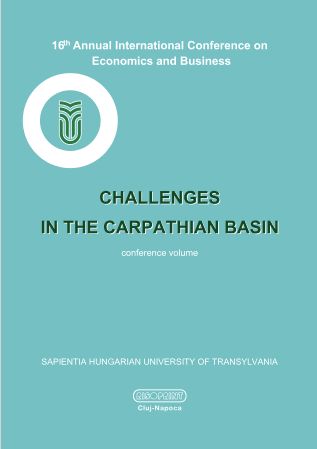Sapientia Hungarian University of Transylvania
CLUJ-NAPOCA, 2023
16th International Conference on Economics and Business
CHALLENGES IN THE CARPATHIAN BASIN
Towards a new sustainability?
BAREITH TIBOR AND FERTŐ IMRE:
THE IMPACT OF MACROECONOMIC FACTORS ON FOOD PRICE INFLATION: THE CASE OF HUNGARY
Recent episodes of high and volatile food inflation in developed and emerging economies have led policymakers around the world to confront the question of how effective monetary policy is in stabilising food price pressures. The small number of empirical studies has been limited to Central European countries, including Hungary. We analyze the role of macroeconomic factors on food inflation in Hungary from January 2007 to November 2022. The long-run relationship is confirmed among the variables using the ARDL bounds testing approach to cointegration. Employing the Nonlinear Autoregressive Distributed Lag (NARDL) as estimation strategy, this study is probably the first attempt to examine the asymmetric relationship between food inflation and macroeconomic variables relevant to monetary policymaking. The results show that a change in consumer price index and USD exchange rate also induces changes in the food inflation in both directions in the long run. However we do not find signicant results for global food price index and monetary policy proxied monetary base. The symmetry test statistics suggest the existence of a symmetric relationship between food price inflation and macroeconomic variables in the long-run as well as in the short-run.
Keywords: food prices, inflation, monetary policy, nardl, long term
KATALIN PLÁNTEK, TIBOR BAREITH AND ANETT PARÁDI-DOLGOS:
THE RESULTS OF THE FINANCIAL AWARENESS SURVEY OF THE HUNGARIAN POPULATION
Abstract
Households and businesses with a more developed financial culture are more likely to avoid financial decisions that are detrimental to them. If they do not take out unnecessarily expensive loans and strive to save, they also contribute to the stability of the financial system at the macroeconomic level. In this case, the state should place less emphasis on redistributive and stabilisation objectives, which can strengthen the country’s competitiveness. The population is faced with a diverse range of financial products. This can pose a serious threat to both the individual and the economy if financial literacy is inadequate. The knowledge gap between the lack of financial knowledge and the knowledge needed to safely use the abundant financial products can first of all undermine the financial resources and wealth of individuals and indirectly the savings of the national economy.
Keywords: financial awareness, financial culture, households, young people



